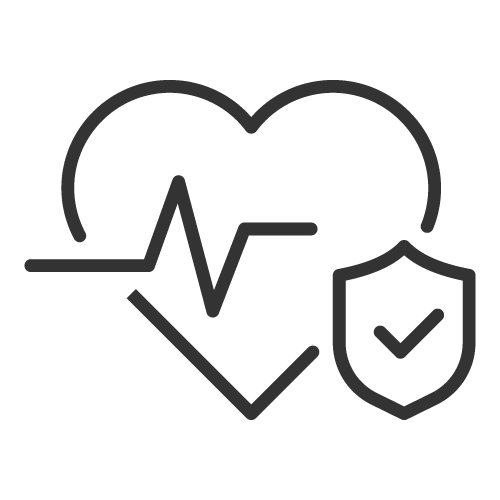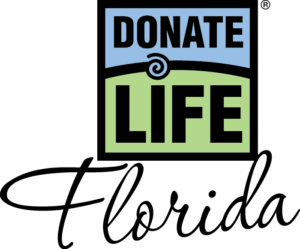Get the Facts
Understand what it really means to say "yes" to organ and tissue donation.
Life Saving Impact

Donors Can Save Multiple Lives
Each person has the power to save 8 lives through organ donation, give sight to 2 people through cornea donation, and provide healing and mobility to 75 more through tissue donation.

Many Hope For Another Chance
Nearly 11 million organ donors in Florida; 5,000+ Floridians awaiting a life-saving donation.

Floridians Helping Floridians
34 of Florida’s 67 Counties have donor rates of 50% or more.

Thousands of Florida lives saved or enhanced
Since 2006, more than 14,000 Floridians have donated their organs and tissue to save and heal the lives of others.
Organ & Tissue Donation
What is organ and tissue donation?
Organ and tissue donation is the process of recovering organs and tissues from a deceased person to save or enhance the lives of others. In Florida, this is a regulated medical process that takes place only after death has been officially declared by independent physicians, or their designees, who are not involved in the organ recovery or transplantation process.
All medical care decisions are made solely by the patient’s medical team and next of kin, completely independent of the donation process. Your medical team’s only priority is to save your life.
What organs and tissues may be donated?
Transplantable organs include:
- Kidneys, liver, heart, lungs, pancreas, and intestine.
- Kidneys, and portions of the liver and lungs may be donated by a living donor, in consultation with the donor’s health care provider.
Tissue:
- Skin is used as a temporary dressing for burns, serious abrasions, and other exposed areas.
- Bone is used in orthopedic surgery to facilitate healing of fractures or prevent amputation.
- Heart valves are used to replace defective valves.
- Tendons are used to repair torn ligaments in knees or other joints. Veins are used in cardiac bypass surgery.
Corneas (eyes):
- Corneas can restore sight.
How does deceased donation work?
Your medical team’s top priority is always to save your life. They do not have access to your donor status until after death is declared and the hospital contacts the local Organ Procurement Organization. All decisions regarding medical care, withdrawal of treatment, and the declaration of death are made solely by your legal next of kin, guardian, and medical team — completely independent of the donation process.
- Under Florida law (FS §765.306), 2 physicians must independently confirm and document a patient’s terminal condition before life-sustaining treatment can be withdrawn.
- Organ and tissue donation can only begin after death is officially declared and consent has been verified through the donor registry or the patient’s family or guardian.
After all life-saving efforts have been exhausted and the medical team determines that death is imminent, the patient may remain on ventilator support to keep the heart and lungs functioning, which preserves organ viability. Once the heart stops beating, organs quickly begin to shut down, limiting their ability to save lives.
Finding a Match
When a patient’s organs begin to fail, medical professionals may evaluate them for a transplant and, if eligible, add them to the national waiting list managed by the United Network for Organ Sharing (UNOS). A national system then matches available donor organs to recipients based on factors such as blood type, body size, medical urgency, distance, tissue type, and time on the list.
Can I choose which organs to donate?
Yes, you are always in control. You may choose to exclude any organs or tissues from your donation. You may also decide whether your organs and tissues may be used for approved medical research, therapy, or education if they are not suitable for transplant. You can view or update your donor record at any time through your My Profile page if you registered online or at a Tax Collector’s office.
How do I make changes to my registration?
If you register online, the screen that confirms your registration displays your unique registration ID and password. If you register at the driver's license office, your driver's license number acts as your registration ID number. You can update your donor profile, limitations, and preferences at any time through your My Profile page.
Is my family or estate charged for donation?
No. Donor families are never charged for organ or tissue donation. After death is declared and consent is confirmed, recovery organizations cover all donation-related costs. Families are only responsible for medical care provided before death and funeral expenses.
Will donation affect funeral arrangements?
No. Great care is taken to preserve the donor's appearance, and the donor's body is treated with respect at all times. Funeral arrangements, including a viewing, if desired, may proceed as scheduled.
Are my organs and tissues used for research?
Organs and tissues not recovered for transplant may be donated for approved medical research only with consent from the registered donor or, if not specified, from the patient’s family or guardian.
How to Specify:
Through the Joshua Abbott Organ and Tissue Donor Registry, you can choose whether to allow donation for research. Select “Donation Limitations” and check “For Research” under Organs and Tissues. If you have already enrolled online or via the driver license or tax collector office, you can update your donor profile, limitations, and preferences at any time through your My Profile page.
The Donor Registry Is Safe & Secure
Who is responsible for administering the Registry?
Florida’s Agency for Health Care Administration selected Donate Life Florida as the contracted vendor to create the Joshua Abbott Organ and Tissue Donor Registry. Donate Life Florida is a coalition of the state’s organ, tissue, and eye donor programs.
How can I be sure my information is kept confidential?
Donate Life Florida adheres to the strictest and most up-to-date guidelines to keep all personal information confidential. Aside from standard information such as name and address, the only sensitive information we require is place of birth, while mother’s maiden name and driver license number are optional.
Do you have a Privacy Policy?
Florida’s organ, tissue, and eye donor registry does not collect any personal information about visitors to this Site (such as names, addresses, telephone numbers or e-mail addresses) unless visitors provide such information voluntarily. If visitors do not want their personal information compiled for internal use, such information should not be submitted through this Web site. View our complete Privacy Policy here.
How can I make a financial contribution to Donate Life Florida?
We appreciate your interest in contributing to our efforts and helping people in need of organ and tissue transplants. Donate Life Florida, a non-profit 501(C)3 charitable organization, is dedicated to saving the lives of thousands of Floridians awaiting life-saving transplants. Your monetary donations are tax-deductible to the maximum extent allowed by law. Contributions may be made to Donate Life Florida by clicking here. Thank you for supporting the effort to save lives through donation. Donate Life Florida!
How To Sign Up
Why register?
One person can save or enhance dozens of lives through the gift of donation. Without documentation of a loved one's wishes, family members may be unsure of organ donation preferences. By enrolling on the registry, your desire to donate is stored in a secure, confidential database. An official record of your donor designation will be readily available for your family or guardian. Thus, should you be medically suitable to donate, your wishes will be respected, and your family will be relieved of the burden of making a decision on your behalf.
Who can enroll on the Joshua Abbott Organ and Tissue Donor Registry?
The Joshua Abbott Organ and Tissue Donor Registry allows individuals to register their authorization to donate specific or all organs and tissues upon their death. If you are under the age of 18, you can register, but your parents or legal guardian have the authority to make the final decision about donation at the appropriate time. That’s why it’s important for families to have conversations about the decision to join the registry.
Can my family decline my decision to donate?
No. Once you enroll in the Joshua Abbott Organ and Tissue Donor Registry, your donor designation grants authorization for donation to take place. Should you be in a position to donate, your next of kin or legal guardian will be presented with documentation of your registration.
How do I make changes to my registration?
If you register online, the screen that confirms your registration displays your unique registration ID and password. If you register at the driver's license office, your driver's license number acts as your registration ID number. You can update your donor profile, limitations, and preferences at any time through your My Profile page.
How do people in other states sign up? Is there a national registry?
Registrations from out-of-state residents are accepted on Florida's registry and serve as an advance directive in accordance with Florida State law in the event one’s death occurs in this state. There is also a national registry, which can be found at RegisterMe.org. Additionally, the nation’s 58 organ procurement organizations make every effort to determine the registry status of each potential donor, even if they are not a resident of the state in which they pass away.
Where can I register?
In addition to online registrations, you may enroll in Florida’s organ and tissue donor registry when you apply for or renew your driver's license or ID card at your local driver's license office or tax collector's office. You can contact Donate Life Florida and request a mail registration form.
I have an advance directive authorizing the donation of my organs. Should I also register on the Joshua Abbott Organ and Tissue Donor Registry?
In Florida, enrolling on the Joshua Abbott Organ and Tissue Donor Registry is the only way to fully ensure your decision to donate will be honored. Florida’s organ and tissue donor registry is reviewed in all potential donation cases prior to discussing donation with an individual’s family. Proof of registration is then made available to your family or guardian.
How do I cancel my registration?
At any time, update your donor profile, limitations, and preferences at any time through your My Profile page. If you enrolled on the Joshua Abbott Organ and Tissue Donor Registry at the tax collector or driver's license office and wish to cancel your registration, you need to (1) remove your name from the Registry and (2) remove the donor designation from your driver's license or ID card and confirm with your tax collector’s office.
If you try to access your record, and it cannot be found, please allow time for the information to transfer. If after seven days you are still unable to access your donor profile, please contact Donate Life Florida at info@donatelifeflorida.org.
How can I make a financial contribution to Donate Life Florida?
We appreciate your interest in contributing to our efforts and helping people in need of organ and tissue transplants. Donate Life Florida, a non-profit 501(C)3 charitable organization, is dedicated to saving the lives of thousands of Floridians awaiting life-saving transplants. Your monetary donations are tax-deductible to the maximum extent allowed by law. Contributions may be made to Donate Life Florida. Thank you for supporting the effort to save lives through donation. Donate Life, Florida!
